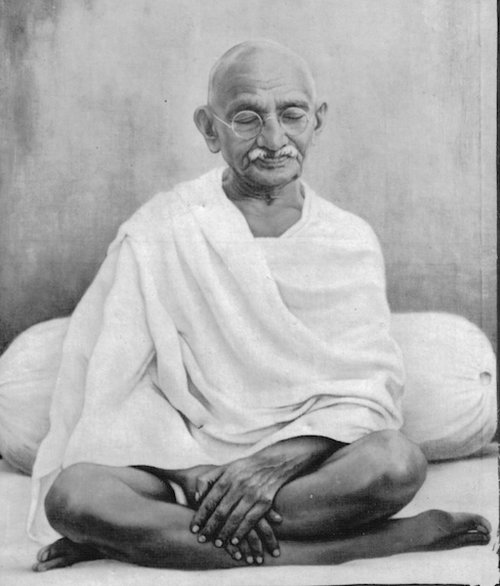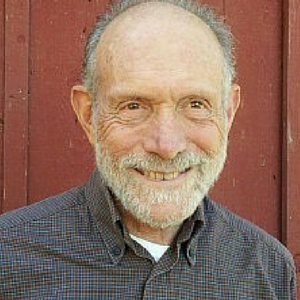
“It is because we have at the present moment everybody claiming the right of conscience without going through any disciplines whatsoever that there is so much untruth being delivered to a bewildered world.” ~M.K. Gandhi
Around Berkeley one often hears, ‘If we only had a million people out there at Livermore we could stop the arms race.’ What this assessment always makes me think is, what if we had one person who was a million times more committed?
Since the activism of the sixties an important section of the peace movement has been trying to understand and incorporate an insight which in a sense that movement foundered on in the early seventies: to what extent do human psychical or spiritual conditions affect the degree of peace or justice we can achieve? Why struggle for newer, fairer social arrangements when in the final analysis greed will only resurface through them the way neocolonialism pushed its way through the world order right after the old-style trappings of colonial power were exposed and largely disestablished? Or to look at this another way, what would a peace movement look like which rose to the challenge of the UNESCO Charter’s truism that war is born “in the minds of men and it is in the minds of men that the defenses of peace must be constructed”?
By the today, a considerable number of people concerned with peace and justice have come to feel that this interior dimension has been overlooked: it is in fact the problem – consequently, some recognize, it could be the solution. We can use the analogy of the “new physics:” As long as we thought of the physical world as separate bodies acting on one another primarily by collision we thought of the social world too as changed only by the mobilization of coercive forces. An individual could not change such a system except by votes, or money, or violence. But scientists, and their popular following, nowadays tend to think of the world as a field of forces. Some recognize that the mind too, is a field of forces, and it is much easier to see how the two might affect each other. It is not quite so fantastic that, as the Katha Upanishad says, “seated here in meditation, the Self moves all the world.”
It is, however, possible to misunderstand this powerful truth. Many groups have sat beaming peace thoughts at the Pentagon without noticeable results; veering, as it were from the apparent error of ‘politics only’ to the counter-error of ‘nice thoughts only.’ The fact is, it is not all clear how the mind and world interact or what we can do about it. Let me try simply for the moment to indicate my own view.
Adolf Hitler once boasted that he had rescued the German nation from its economic dismemberment and humiliation at the hands of the allied powers at the end of the First World War singlehandedly in the space of fifteen years “by my fanatical will.” There is nothing occult about this. The demented power of his will communicated itself to millions of people; even many of his victims fell under its hypnotic spell. And at the same time, by the peculiar irony of the Twentieth Century, Mahatma Gandhi was moving hundreds of millions in the precisely opposite direction. When Gandhi fasted, even someone who considered him or herself unpolitical and not a volunteer in the great Satyagrahas would feel it a sin to eat. Once again, it was the Mahatma’s powerfully focused will which enabled him, in Martin Luther King’s words, to “lift the love ethic of Jesus above mere interaction between individuals to a powerful and effective social force on a large scale.”
The fact is, most of our resources lie locked up in the unconscious. Just as genetic information has been carefully protected in the cell nuclei so that – until very recently, when we found out how to tamper with it – even the biggest manmade mistakes could only injure the outer organism and perish with it, so too most of the power locked up in the mind is not accessible to us by ordinary means of manipulation. This power is closely connected with what Shaw and others called the Life Force. Our daily life – all our appetites, desires, thoughts and activities –runs off the “interest” of our packet of this immense, largely unsuspected energy. By garnering carefully the energy available to him, as to us, Gandhi was able to break through into the “principle,” bringing untold resources to do good into his hands.
In a sense the mass media are like the new tools of genetic engineering, giving us access to deeper reserves of the mind’s power than has been heretofore possible, but since no wisdom and no particular goodwill underlies the process, making if you will little Hitlers of us, by degrading the human image which each of us carries within and which so very strongly determines how we think and act. (Hitler once told William Shirer, “Everyone has his price, and you’d be surprised in most of us how low that price is.”) This effect of the mass media goes far to explain why the peace movement is making so little headway, but in its negative way, it also demonstrates that the crucial human predisposition towards peace and justice is alterable.
Simply put, meditation would enable us to reverse that mass media process: what group folly, motivated by greed, is driving asunder, individual discipline can pull back together. Where the social currents are slowly sweeping us back to barbarism we can consciously wade forward, making us each in our own way little Gandhis – and perhaps some of us fairly big ones. As Storm Jameson, a British essayist wrote gazing at the coming clouds of the “second global conflict,” all of us wish for peace, but we do not will it. Through meditation, we can will it. We can slowly recapture our will and bend its immense power to the cause we consciously approve of.
I hope I am conveying the difficulty of this task as well as the sense of hope it communicates. Thinking good thoughts is probably helpful, but certainly not the kind of force I am describing. The depth of psychological change I am referring to here cannot happen at an occasion. The battle has to be renewed every day – twice a day if one is going to be serious – and go on the rest of our life. It has little to do with pleasant thoughts or indeed any thoughts (as Sri Eknath Easwaran’s directions, here, will clarify) and many daunting ancillary disciplines have to be added to sustain this practice and realize its full effects.
In this conscious discipline, not only is immense personal power gradually added to us but the wisdom and compassion to direct it. Where would all of Gandhi’s charisma have gotten him without his uncanny shrewdness, the wonder of his friends and foes alike? By what he called conscious struggle to conserve his anger (thus converting it into compassion) he slowly brought his mind under control. This, I believe, gave him access to immensely deeper resources of psychological power; in Hitler’s case, they had access to him. Thus they propelled him onto a course that led inevitably to folly and extreme misery, while Gandhi was able to direct his ever-growing energies efficiently to good – to his own sublime happiness, of which he leaves abundant testimony, and the supreme good of society, which will become evident to us, I believe, when we gather the strength to develop the complex legacy of his many experiments.
Meditation, then, bypasses the traditional dichotomy between contemplative and active modes; when systematically developed by dedicated individuals under the guidance of a competent teacher (indispensable, as far as my experience goes), it gives them the power and the judgment to overcome chaotic forces of the mind and of the world with equal effectiveness. I maintain that a movement leavened by lifetime meditators like this would change the balance of forces and win the peace – how soon would only depend on how many they were, and of course how good at it.
What would such a movement look like? I predict it would: 1) devote much more attention to the devastating effects of the mass media, recognizing intuitively that unless we reverse the degradation of the human image that is taking place so universally we can never reverse the arms race or any other species of violence; 2) reverse the emphasis on confrontational style and obstruction (though it would not abandon them) to one of constructive action and education. 3) Its expressions would everywhere succeed much better at the fundamental Christian strategy of never confusing destructive policies with the people ignorantly responsible for them. In a word, its nonviolence power would be much more accurate in action and in general reconstruct the mental environment and the prevailing values fundamentally, so that all political changes would be more enduring and more positive. As Christopher Lasch recently wrote, “Empowerment would enable poor people to compete for the brokerage of political power on a more equal footing, but it would not change the definition of political power as brokerage.” A meditation-leavened movement would.
My analysis might be wrong, but in my view, only a deep change in key people who can exercise leadership – or similar small changes in all participants, or both – would direct our movement to the heart of the problem, and put in our hands the tools to correct it, permanently. Only so leavened, in other words, can we “change our way of thinking” fundamentally and create the “paradigm shift” towards a peace system before it is too late. And as far as I know at present, only meditation can give us the power for that change.
These are tall claims. I base them on my own decades’ long experience, however, and invite you to test them the only way that is finally possible – by yours.
This article is from the Metta Center’s deep archive, written by Michael Nagler on a type-writer and submitted, we believe, to a yoga journal. It still holds relevance for our current events, and so we gratefully share it here.








